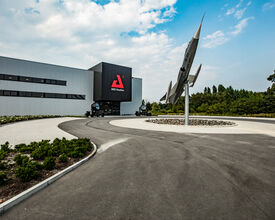AED Group is for sale. To take the step from the European to the world top, the specialist in audiovisual material is looking for a strong party to help finance its ambitions.
"I'm proud, but also a little sad." Stefan Yee, the founder and CEO of PE Group, has mixed feelings. The investment company has been in the capital of showbiz supplier AED Group since 2007, an atypically long period for a venture capitalist. But that may soon come to an end. The board of directors of AED has decided to put the company up for sale.
AED Group started in 1985 as AED Rent, when 16-year-old Glenn Roggeman decided that he was more interested in lugging light and sound installations than going to school. "In that period, everyone just bought installations themselves, after which they stood idle for more than half the time," recalls Roggeman. "So I set up a rental model."
AED Group is now starting a sales process to find a new major shareholder to guide the company through the next growth phase. The idea caught on. Roggeman's business grew rapidly and soon internationalized to France, Germany, the Netherlands, the United Kingdom and the United Arab Emirates. After which matters such as leasing, distribution, second-hand sales and even the in-house development of material were added. Today, the AED Group comprises more than ten subsidiaries, which in six countries "are the reference in their field, even though they are small Belgians", says Roggeman.
In that growth trajectory, AED has never called on external finance. Over the years, investors did step in, but this always involved a partial exit from Roggeman. Today, the management still owns about 21 percent, the company holds about 10 percent of its own shares and the remaining 69 percent is divided among shareholders PE Group (since 2007), ING Private Equity and Phifin (both since 2011). .
In that structure, AED grew strongly year after year, from a turnover of about 4 million euros in 2005 to about 90 million euros last year. The group then recorded a gross operating profit (EBITDA) of around 24 million euros and an operating cash flow of 32.6 million euros. This shows that the corona crisis, which hit the event sector heavily, has not left any lasting wounds in the company.
AED now wants to continue that long-term growth trajectory with a further substantive broadening of the business and internationalization to other continents. "During the corona crisis, we invested heavily in both extra capacity and infrastructure," says Roggeman. "Everything is ready for a growth jump of another 40 percent."
If I had been an American, we might just be world leaders right now.
That leap is best made with a new major shareholder in the capital, is the analysis of the board of directors. That is not illogical. The normal investment horizon in private equity is four to seven years on average, but AED's outside shareholders have been in the capital for twice or three times as long. "Nothing is mandatory, but now is just a good time to sell," says Yee. "This new phase that the company is entering requires investment and a portion of patience. If we stay put now, it will be another five to six years. We will remain a private equity company, we will live on our exits."
But this sales process, which is supervised by ING Corporate Finance, is about more than just giving shareholders an exit. A larger party - in the audiovisual sector or in venture capital - would also be financially better placed than the current shareholders to realize AED's ambitions. If the group wants to become a global company in its capital-intensive business, a shareholder with deep pockets can only help. "A sale to a major player is a logical next step in the growth story that we have written together with Glenn," says Yee.
Don't get bored
It is certain that the external investors want to exit in the event of a sale. Whether founder Roggeman will do the same is less clear. The CEO says he is keeping all options open. "Everything will depend on the expectations of the new shareholder. If they want to continue with me for the next 10 to 15 years, I am open to that. If not, that is also possible. The interest of the company prevails. I have 16 companies, I will never be bored anyway."
Just like with Yee, a sale will give Roggeman mixed feelings, says the founder. "I am very proud of what we have achieved here, I think I can safely say that we have written a special story with AED. The only thing I find a bit unfortunate is that it is again very difficult to get a to build a global company. To realize that ambition, we have to sell. If I had been an American, we might just be world leaders by now."
One AED is not the other
If AED Group soon gets a new majority shareholder, that party will not immediately own the AED Studios in Lint. That media park, formerly Alfacam, is a separate entity with a different shareholder structure. The studios, where major live shows and Hollywood films are recorded, are only 40 percent owned by AED Group. The other 60 percent belong to Roggeman himself.
Dutch
AED Group staat te koop. Om de stap te zetten van de Europese naar de wereldtop zoekt de specialist in audiovisueel materiaal een sterke partij om de ambities te helpen financieren.
"Ik ben fier, maar ook wat triest." Stefan Yee, de oprichter en CEO van PE Group, heeft gemengde gevoelens. De investeringsmaatschappij zit al sinds 2007 in het kapitaal van de showbizzleverancier AED Group, een atypisch lange periode voor een durfkapitalist. Maar daar komt binnenkort wellicht een einde aan. De raad van bestuur van AED heeft beslist het bedrijf in de etalage te zetten.
AED Group begon in 1985 als AED Rent, toen de 16-jarige Glenn Roggeman besloot dat zeulen met licht- en geluidsinstallaties hem meer interesseerde dan schoollopen. "In die periode kocht iedereen nog gewoon zelf installaties aan, waarna die ruim de helft van de tijd niets stonden te doen", herinnert Roggeman zich. 'Dus zette ik een verhuurmodel op."
AED Group start nu een verkoopproces op om een nieuwe grootaandeelhouder te vinden, die het bedrijf moet begeleiden in de volgende groeifase. Het idee sloeg aan. De business van Roggeman groeide als kool en internationaliseerde algauw naar Frankrijk, Duitsland, Nederland, het Verenigd Koninkrijk en de Verenigde Arabische Emiraten. Waarna er zaken als leasing, distributie, tweedehandsverkoop en zelfs de eigen ontwikkeling van materiaal bijkwamen. Vandaag omvat de AED Group meer dan tien dochterbedrijven, die in zes landen "als kleine Belgjes toch de referentie zijn in hun vakgebied", zegt Roggeman.
In dat groeitraject heeft AED nooit een beroep gedaan op externe financiën. Door de jaren heen stapten wel investeerders in, maar het ging daarbij steevast om een gedeeltelijke exit van Roggeman. Vandaag heeft het management nog zo'n 21 procent in handen, houdt het bedrijf zo'n 10 procent eigen aandelen aan en is de overige 69 procent verdeeld onder aandeelhouders PE Group (sinds 2007), ING Private Equity en Phifin (allebei sinds 2011).
In die structuur groeide AED jaar na jaar sterk, van zo'n 4 miljoen euro omzet in 2005 naar zo'n 90 miljoen euro vorig jaar. Daarop boekte de groep een brutobedrijfswinst (ebitda) van zo'n 24 miljoen euro en een operationele cashflow van 32,6 miljoen euro. Daaruit blijkt dat de coronacrisis, die de eventsector zwaar trof, geen blijvende wonden heeft geslagen in het bedrijf.
Aan dat jarenlange groeitraject wil AED nu een vervolg breien met een verdere inhoudelijke verbreding van de business en een internationalisering naar andere continenten. "We hebben tijdens de coronacrisis flink geïnvesteerd in zowel extra capaciteit als infrastructuur', zegt Roggeman. "Alles staat klaar voor een groeisprong van nog eens 40 procent."
Als ik een Amerikaan was geweest, waren we nu wellicht gewoon wereldleider.
Die sprong wordt wel het best gemaakt met een nieuwe grootaandeelhouder in het kapitaal, is de analyse van de raad van bestuur. Onlogisch is dat niet. De normale investeringshorizon in private equity is gemiddeld vier à zeven jaar, maar de externe aandeelhouders van AED zitten al dubbel of driedubbel zo lang in het kapitaal. "Niets moet, maar het is nu wel gewoon een goed moment om te verkopen", zegt Yee. "Deze nieuwe fase die het bedrijf ingaat, vergt investeringen en een portie geduld. Als we nu blijven zitten, is het meteen weer voor vijf à zes jaar. We blijven wel een private-equitybedrijf, we leven van onze exits."
Maar dit verkoopproces, dat wordt begeleid door ING Corporate Finance, draait om meer dan alleen de aandeelhouders een exit te gunnen. Een grotere partij - in de audiovisuele sector of in het durfkapitaal - zou financieel ook beter geplaatst zijn dan de huidige aandeelhouders om de ambities van AED waar te maken. Wil de groep het in haar kapitaalintensieve business tot wereldbedrijf schoppen, dan kan een aandeelhouder met diepe zakken alleen maar helpen. "Een verkoop aan een grote speler is een logische volgende stap in het groeiverhaal dat we samen met Glenn hebben geschreven", zegt Yee.
Niet vervelen
Dat de externe investeerders bij een verkoop willen uitstappen, staat vast. Of ook oprichter Roggeman dat zal doen, is minder duidelijk. De CEO houdt naar eigen zeggen alle opties open. "Alles zal afhangen van de verwachtingen van de nieuwe aandeelhouder. Als die de komende 10 à 15 jaar samen met mij verder wil, sta ik daarvoor open. Is dat niet zo, dan kan dat ook. Het belang van het bedrijf primeert. Ik heb 16 bedrijven, ik zal me sowieso nooit vervelen."
Net als bij Yee zal een verkoop Roggeman gemengde gevoelens bezorgen, zegt de oprichter nog. "Ik ben erg fier op wat we hier hebben neergezet, ik denk dat ik gerust mag zeggen dat we met AED een bijzonder verhaal hebben geschreven. Het enige wat ik een beetje jammer vind, is dat het toch weer heel moeilijk blijkt om vanuit België een wereldbedrijf te bouwen. Om die ambitie waar te maken moeten we wel verkopen. Als ik een Amerikaan was geweest, waren we nu wellicht gewoon wereldleider."
Het ene AED is het andere niet
Als AED Group straks een nieuwe meerderheidsaandeelhouder krijgt, is die partij niet meteen ook eigenaar van de AED Studios in Lint. Dat mediapark, het vroegere Alfacam, is een afzonderlijke entiteit met een andere aandeelhoudersstructuur. De studio's, waar onder meer grote liveshows en Hollywoodfilms worden opgenomen, zijn maar voor 40 procent in handen van AED Group. De overige 60 procent zijn van Roggeman zelf.
Bekijk ook: Glenn Roggeman over zijn plannen met AED Studios (bijna 10 jaar terug)






